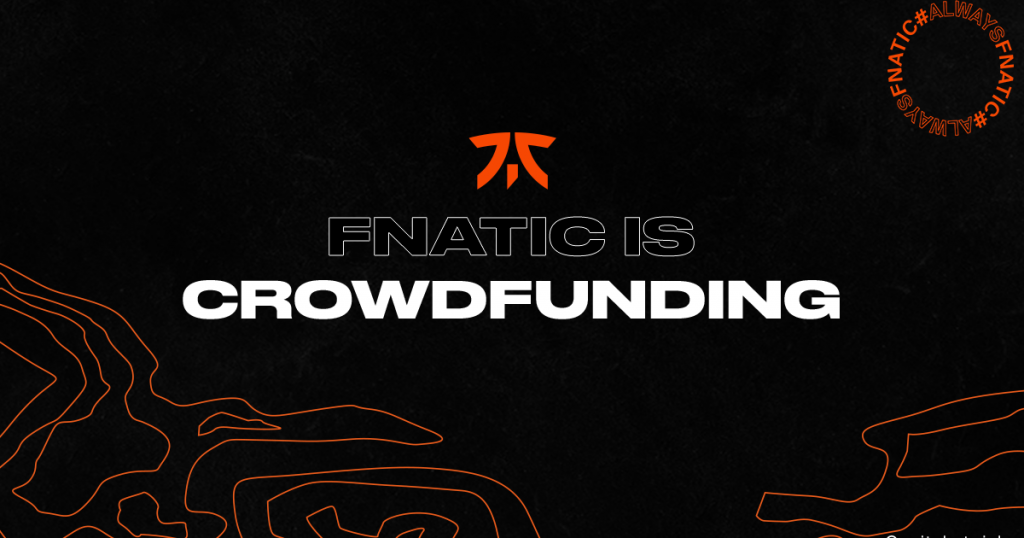Crowdfunding in the video games space is not a recent phenomenon. Many game developers and publishers have utilised crowdfunding to gain the financial support they need to create specific titles.
This trend goes at least as far back as 2012 when Double Fine Adventure (later renamed Broken Age) launched on Kickstarter with an initial target of $400,000 (~£292,504). By the end of the funding round, the game surpassed more than $3m (~£2.19m).
Crowdfunding in esports, however, hasn’t been quite utilised as a source of investment for entities in the sector. Most esports companies have instead relied on venture capital funding or other private investment opportunities to drive their operations.

This is not to say that esports-focused start-ups haven’t used crowdfunding in the past, but there was never really a scope of how successful this form of financing could be. Until 2020, that is.
Last year saw a variety of esports companies, of varying stature, commit to crowdfunding to kickstart their ventures, provide extra financial support, or even as a method of fan engagement. The question is, what changed?

According to Ben Goldhaber, the CEO of esports content hub Juked.gg, the perception of crowdfunding has seemingly been altered.
He explained: “We hadn’t seriously considered crowd equity due to a perceived negative stigma, whether that stigma was true or not.
“It feels like the tone has changed. Crowd equity is becoming more and more common, and more and more accepted/understood not just by VCs but by average retail investors.”
Juked launched its crowdfunding campaign on Republic.co in September 2020, which concluded earlier this month. In total, the esports start-up raised $1.07m (~£778,692,) with more than 2,500 individual investors backing the firm.
“Our goal was to raise at least $500,000 (~£365,585), but we gave ourselves nine months to do that. We ended up raising the entire $1.07M in less than four months,” Goldhaber added.
The CEO did caveat this by highlighting another major factor involved in crowdfunding: transparency.
Goldhaber continued: “It wasn’t easy to get things rolling, from the legal and organisational side to putting together our marketing strategy to answering dozens upon dozens of tough questions from investors. But the pace of investments far exceeded our expectations.”

RELATED: Fnatic raises $10m and launches new crowdfunding equity campaign
There are various ways in which crowdfunding could be useful to an esports entity. However, one benefit of the method — to boost fan engagement — had never really been explored before. Fnatic sought to change that by launching an unexpected crowdfunding equity campaign through Crowdcube.
Unlike previous esports campaigns, Fnatic was already an established, international brand and sought a different opportunity — one that crowdfunding could provide. Speaking to ESI in December last year, Fnatic’s CEO and Founder Sam Mathews discussed the organisation’s approach.
“The benefits of crowdfunding met our primary need, which was to offer a new experience and opportunity to our fans,” he commented. “We’d recommend the process to any other business who wants to achieve the same thing.”
Besides fan engagement, crowdfunding can also be a legitimate source of investment for big companies, as Mathews highlighted: “In fintech, for example, the likes of Revolut and Monzo have crowdfunded in their series Bs and later. Brewdog as well has historically crowdfunded at all stages of the company’s growth and still does it to date.”
[primis_video widget=”5183″]
In 2020, Fnatic became the first esports team to launch a crowdfunding campaign. This again highlights how little this form of investment has been utilised in the industry. Similar to Juked, the organisation smashed its target. The firm’s Crowdcube campaign attracted 4,000 investors and doubled its expected total by securing over £2m.
Mathews added: “For our fans, the crowd raise gives them the chance to really deepen their relationship with Fnatic, and gain a level of insight into and access to how we run our business that no other team is currently offering.”

Whilst there are certainly many positives to crowdfunding, this doesn’t mean that every esports entity should adopt this form of investment. Firstly, crowdfunding does rely on participants being fully invested in either the ideas a company offers or the firm itself. As a result, a lot of time and effort has to be put into marketing the campaign. Even then engagement is not guaranteed.
Secondly, as Goldhaber noted, a company has to be extremely transparent. Particularly with regards to its business model, future plans and even, in some cases, its finances.
However, the latter isn’t necessarily a bad thing for the esports industry, as Fnatic’s Mathews explained: “It’s easy to forget exactly how much hype there is around our industry, but also the degree of scepticism around some of the claims being made. Engaging with investors openly and honestly helps address that scepticism, and also drives accountability and delivery among the Fnatic team.”
So, does this mean that esports firms, organisations and start-ups should immediately jump solely into crowdfunding? Quite simply, no. There’s still a range of other benefits that makes venture capital investment appealing. It’s important to note that on the same day Fnatic launched its crowdfunding campaign, the organisation also raised £10m in an investment funding round.

RELATED: Hitmarker raises £521K in crowdfunding campaign
Mobile esports service provider Gamerpro is another company that opted to go down the crowdfunding route. However, the firm has also announced its participation in the UK’s Future Fund scheme. Future Fund provides certain UK companies with convertible loans to continue their growth despite economic obstacles caused by the pandemic.
Following the firm’s announcement that its Seedrs campaign has gone public, Gamerpro’s CEO Gary Sonyak spoke about how crowdfunding can be utilised and combined with other forms of investment.

He said: “Crowdfunding could be a good marketing tool to enhance the popularity of the brand or company. Or even better to use as a monetisation channel since most of the esports-related companies are struggling to monetise their audience effectively. I think, combining crowdfunding with Future Fund is the very best way to raise funds nowadays, not only in esports.”
Juked’s Goldhaber also pointed out that despite recent changes in the US allowing companies to raise more from crowd equity campaigns, the intention is to still look at other investment opportunities.
Goldhaber explained: “In the US, the limit actually was increased from $1.07m to $5m (~£3.66m) that companies can raise via crowd equity, so you could theoretically side-step traditional venture capital altogether if you so desired. That said, our goal is to raise from institutional investors at some time in the future.”
Juked, Fnatic and Gamerpro are just a few esports entities that have found success in the world of crowdfunding. Esports job site Hitmarker also successfully raised an estimated £521,000 last year, with this being the company’s second crowdfunding venture.
As esports in general gains more traction in mainstream media, greater investment opportunities will naturally arise. As a result, more venture capital funding will likely be utilised, whilst some companies, such as Luckbox, have even looked at the stock market as a possibility. The betting company listed on Toronto’s TSX Venture Exchange in mid-December 2020. In the end, 2020 proved that crowdfunding can be seen as a viable investment opportunity in esports. With these successes, expect to see more entities in their growth phase crowdfund on platforms like Seedrs, Crowdcube and Republic in the near future.

